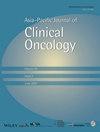Exploring patient reported quality of life in lung cancer patients: A qualitative study of patient-reported outcome measures
Abstract
Objective
Lung cancer is the leading cause of cancer-related death globally and provides a major disease burden likely to substantially impact quality of life (QoL). Patient-reported outcome measures (PROMs) have been identified as effective methods of evaluating patient QoL. Existing lung cancer–specific PROMs however have uncertain utility and minimal patient involvement in their design and development. This qualitative study aimed to evaluate the patient perspective of existing PROMs and to explore their appropriateness for population-based descriptions of lung cancer–related QoL.
Methods
A descriptive qualitative study was conducted consisting of semi-structured interviews with 14 patients recruited from the Victorian Lung Cancer Registry and Alfred Hospital using purposive sampling. Interviews first explored the factors most important to lung cancer patients QoL, and second, patient's perspectives on the appropriateness of existing PROMs. Thematic analysis was used to develop themes, and content analysis was conducted to determine PROM acceptability.
Results
Five novel themes were identified by patients as being important impacts on QoL: Personal attitude toward the disease is important for coping; independence is valued; relationships with family and friends are important; relationships with treating team are meaningful; personal and public awareness of lung cancer is limited. These patient-identified impacts are poorly covered in existing lung cancer–specific PROMs. Patients welcomed and appreciated the opportunity to complete PROMs; however, they identified problems with existing PROMs relevance, tone, and formatting.
Conclusion
Existing lung cancer PROMs poorly reflect the five themes identified in this study as most important to lung cancer patients QoL. This study reaffirms the need to review existing PROMs to ensure utility and construct validity. Future PROM development must engage key patient-generated themes and evolve to reflect the changing management and therapeutic landscape.



 求助内容:
求助内容: 应助结果提醒方式:
应助结果提醒方式:


